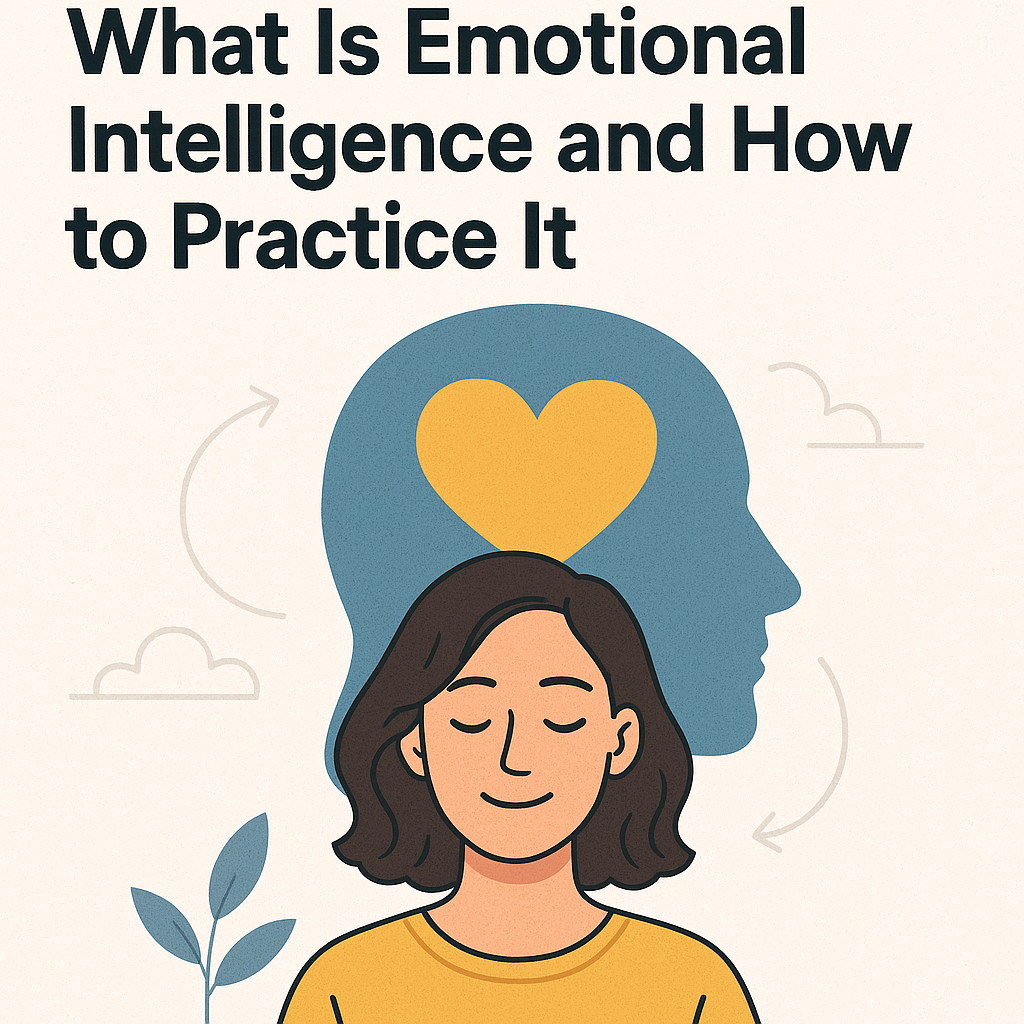Emotional intelligence (EI), also known as emotional quotient (EQ), is the ability to recognize, understand, manage, and influence emotions — both your own and those of others. Unlike IQ, which is often considered innate and relatively fixed, emotional intelligence is a skill that can be developed and refined over time.
Developing emotional intelligence can enhance relationships, improve mental well-being, and help navigate the complexities of everyday life with more clarity and compassion.
The Five Core Components of Emotional Intelligence
The concept of emotional intelligence became popular through psychologist Daniel Goleman, who defined five key elements:
1. Self-Awareness
Self-awareness is the ability to recognize your own emotions, understand what causes them, and observe how they influence your behavior and thoughts.
People with high self-awareness:
- Acknowledge their emotional states without judgment
- Understand the impact of emotions on decision-making
- Know their strengths and limitations
2. Self-Regulation
This involves managing your emotions in healthy ways — staying in control rather than being controlled by your emotions.
Self-regulation looks like:
- Pausing before reacting
- Managing stress and impulses constructively
- Staying calm and flexible during conflict or change
3. Motivation
Emotionally intelligent people are motivated by internal values rather than external rewards. They pursue goals with resilience and optimism, even in the face of obstacles.
Key traits of high emotional motivation include:
- Strong desire to improve and learn
- High levels of initiative
- Commitment to long-term goals
4. Empathy
Empathy is the ability to understand how others feel and respond with care and consideration. It doesn’t mean always agreeing, but rather acknowledging others’ perspectives.
Empathetic people:
- Listen without interrupting
- Recognize nonverbal emotional cues
- Respond to others’ feelings with respect
5. Social Skills
These include the ability to communicate clearly, build healthy relationships, and navigate social complexities with ease.
Strong social skills involve:
- Conflict resolution
- Team collaboration
- Persuasive communication
- Constructive feedback
Why Emotional Intelligence Matters
EI is often more predictive of success than IQ, especially in leadership, teamwork, and interpersonal relationships. Studies show that people with high emotional intelligence tend to:
- Make better decisions under pressure
- Have more satisfying relationships
- Adapt to change more easily
- Experience less burnout and stress
- Lead more effectively
In short, EI is not just a “soft skill” — it’s a critical life skill that influences every area of our personal and professional lives.
How to Develop Emotional Intelligence
Here are practical ways to begin developing and strengthening your emotional intelligence:
1. Practice Mindful Awareness
Mindfulness is the foundation of self-awareness. By taking time to pause and observe your emotions, you create space between stimulus and response.
Try this:
- Set a timer for 3 minutes and simply breathe
- Ask yourself, “What am I feeling right now?”
- Label the emotion without judgment (e.g., frustration, joy, fear)
This regular practice helps you become more aware of emotional patterns.
2. Keep a Journal
Journaling is a powerful tool for tracking emotional triggers, exploring how you react, and identifying growth opportunities.
Daily journal prompts might include:
- What made me feel strong emotions today?
- How did I react?
- What could I have done differently?
Writing things down offers clarity and helps you reflect more objectively.
3. Learn to Pause
In moments of stress or conflict, the best response often starts with a pause. Instead of reacting impulsively, give yourself a moment to breathe and choose a thoughtful response.
This short pause helps you shift from emotional reaction to emotional regulation.
4. Ask for Feedback
Sometimes others see things we don’t. Gently ask trusted friends, coworkers, or mentors for feedback on how you handle emotions or interact with others.
Questions to ask:
- “How do I come across in difficult conversations?”
- “What’s one thing I could do to improve how I relate to others?”
Be open to listening without defensiveness — it’s an opportunity for growth.
5. Practice Active Listening
When in conversation, give your full attention. Don’t plan your response while the other person is speaking. Instead, listen to understand — not to reply.
Tips for active listening:
- Make eye contact
- Avoid interrupting
- Summarize what the person said to ensure understanding
This builds empathy and shows genuine respect for the other person.
6. Manage Stress in Healthy Ways
High emotional intelligence isn’t about never feeling stressed — it’s about managing it in ways that don’t harm you or others.
Try:
- Deep breathing exercises
- Gentle physical activity (like yoga or walking)
- Talking with a supportive friend
- Setting healthy boundaries
Stress resilience is a hallmark of emotionally intelligent people.
7. Practice Empathy in Daily Life
When you encounter someone who is upset, pause before offering advice or judgment. Instead, validate their feelings by saying something like:
- “That sounds really tough.”
- “I can imagine why you’d feel that way.”
- “Thanks for sharing that with me.”
Empathy builds trust and makes others feel seen and heard.
Emotional Intelligence in Real Life
Let’s imagine a workplace scenario. You’re in a meeting, and a colleague criticizes your idea in front of others. Without emotional intelligence, you might react defensively or shut down. But with EI, you might:
- Recognize your initial anger (self-awareness)
- Take a breath before responding (self-regulation)
- Remember your bigger goal (motivation)
- Consider your colleague’s perspective (empathy)
- Respond calmly and assertively (social skill)
That single moment can preserve your credibility, relationships, and emotional well-being.
Growing Your Emotional Intelligence Is a Lifelong Process
Like any valuable skill, emotional intelligence takes time and effort to build. You won’t get it right every time — and that’s okay. The goal is progress, not perfection.
By becoming more aware of your emotions and intentionally practicing better responses, you’ll create a more resilient, compassionate, and empowered version of yourself.
Whether in your personal life or professional environment, emotional intelligence is one of the most transformative tools you can develop.
